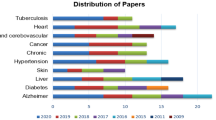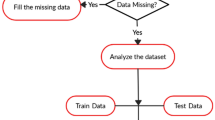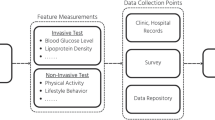Abstract
Cardiovascular diseases (CVDs) aredisorders of the heart and blood vessels and are a major cause of disability and premature death worldwide. Individuals at higher risk of developing CVD must be noticed at an early stage to prevent premature deaths. Advances in the field of computational intelligence, together with the vast amount of data produced daily in clinical settings, have made it possible to create recognition systems capable of identifying hidden patterns and useful information. This paper focuses on the application of Data Mining Techniques (DMTs) to clinical data collected during the medical examination in an attempt to predict whether or not an individual has a CVD. To this end, the CRossIndustry Standard Process for Data Mining (CRISP-DM) methodology was followed, in which five classifiers were applied, namely DT, Optimized DT, RI, RF, and DL. The models were mainly developed using the RapidMiner software with the assist of the WEKA tool and were analyzed based on accuracy, precision, sensitivity, and specificity. The results obtained were considered promising on the basis of the research for effective means of diagnosing CVD, with the best model being Optimized DT, which achieved the highest values for all the evaluation metrics, 73.54%, 75.82%, 68.89%, 78.16% and 0.788 for accuracy, precision, sensitivity, specificity, and AUC, respectively.




Similar content being viewed by others
References
Cardiovascular diseases (cvds). https://www.who.int/news-room/fact-sheets/detail/cardiovascular-diseases-(cvds)
Anderson K.M., Odell P.M., Wilson P.W., Kannel W.B.: Cardiovascular disease risk profiles. American Heart Journal 121(1):293–298, 1991
Brito C., Esteves M., Peixoto H., Abelha A., Machado J. (2019) A data mining approach to classify serum creatinine values in patients undergoing continuous ambulatory peritoneal dialysis. Wirel. Netw:1–9
Ferreira D., Silva S., Abelha A., Machado J.: Recommendation system using autoencoders. Appl. Sci. 10(16):5510, 2020
Jothi N., Husain W., et al.: Data mining in healthcare–a review. Procedia Computer Science 72:306–313, 2015
Neto C., Brito M., Lopes V., Peixoto H., Abelha A., Machado J.: Application of data mining for the prediction of mortality and occurrence of complications for gastric cancer patients. Entropy 21(12):1163, 2019
Parva E., Boostani R., Ghahramani Z., Paydar S.: The necessity of data mining in clinical emergency medicine; a narrative review of the current literatrue. Bulletin of Emergency & Trauma 5(2):90, 2017
Sousa R., Ferreira D., Abelha A., Machado J.: Step towards monitoring intelligent agents in healthcare information systems. In: World Conference on Information Systems and Technologies. Springer, 2020, pp 510–519
Thomas H., Diamond J., Vieco A., Chaudhuri S., Shinnar E., Cromer S., Perel P., Mensah G.A., Narula J., Johnson C.O., et al. (2018) Global atlas of cardiovascular disease. Global heart 13(3)
Timmis A., Townsend N., Gale C.P., Torbica A., Lettino M., Petersen S.E., Mossialos E.A., Maggioni A.P., Kazakiewicz D., May H.T., et al.: European society of cardiology: cardiovascular disease statistics 2019. European Heart Journal 41(1):12–85, 2020
Ulianova S. (2019) Cardiovascular disease dataset. https://www.kaggle.com/sulianova/cardiovascular-disease-dataset
Funding
This work has been supported by FCT – Fundação para a Ciência e Tecnologia within the R&D Units Project Scope: UIDB/00319/2020.
Author information
Authors and Affiliations
Contributions
Conceptualization, B.M.; Methodology, B.M., D.F., and C.N.; Software, B.M.; Validation, D.F., and C.N.; Writing: B.M, and D.F.; Project Administration, A.A, and J.M.; Funding Acquisition, A.A, and J.M.
Corresponding author
Ethics declarations
Conflict of interests
Bárbara Martins, Diana Ferreira, Cristiana Neto, António Abelha, and José Machado declare that they have no conflict of interest.
Additional information
Publisher’s Note
Springer Nature remains neutral with regard to jurisdictional claims in published maps and institutional affiliations.
Ethical approval
This article does not contain any studies with human participants or animals performed by any of the authors.
This article belongs to the Topical Collection: Health Information Systems & Technologies
Guest Editors: Álvaro Rocha and Joaquim Gonçalves
Rights and permissions
About this article
Cite this article
Martins, B., Ferreira, D., Neto, C. et al. Data Mining for Cardiovascular Disease Prediction. J Med Syst 45, 6 (2021). https://doi.org/10.1007/s10916-020-01682-8
Received:
Accepted:
Published:
DOI: https://doi.org/10.1007/s10916-020-01682-8




